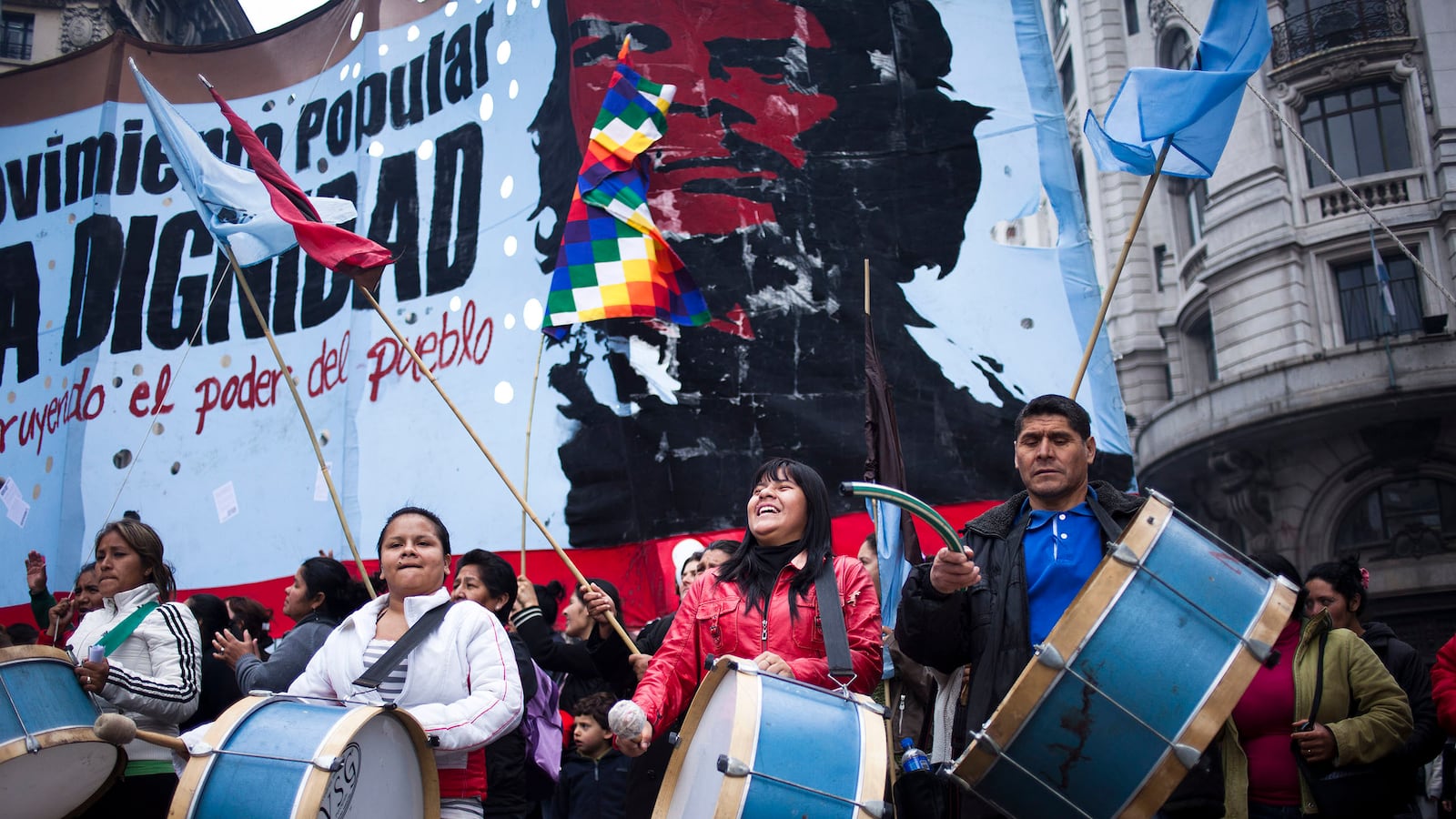In a small room above a funky little shop in San Telmo, a meeting is about to begin. One by one, members of The Net Party filter in. They kiss each other on the cheek and help themselves to beer in plastic cups. I get swept up in the cheek kissing. After thirty or forty kisses, I start to wonder how many members are in The Net Party. It feels a bit like a receiving line at an Italian wedding. Eventually, the room fills up and those in attendance take their seats along the green leather banquette, or on the bar, or on the floor, or anywhere there is space, really. It’s the party’s first meeting since last year’s election and there is an electricity in the air—though I can’t tell if it’s a good one.

The Net Party (Partido de la Red, in Spanish) is one of several new avant-garde parties burrowing their way into the Argentinan political landscape. What makes them different is their platform of a tech-enabled, semi-direct democracy using an open-source software members have developed. The Net Party did well in last year’s legislative election, surprising a lot of people. But in order to succeed, the band of ministerial mavericks needs to capitalize on their momentum.
The atmosphere in the small, hot room feels more like a late-seventies Apple Computers brainstorming retreat than a modern political think-tank. There are more scuffed-up Chuck Taylors than spit-shined Rockports. More Levis than Dockers. More plaid shirts than pressed shirts. Not a single tie in sight. Scruffy beards abound, along with constant tweeting (in fact, The Net Party’s manifesto is comprised of a series of sixty tweets). Still, there are plenty of pens and clipboards and loose pieces of paper floating around to give the gathering a professional edge.
Pia Mancini, a young political-science maven and one of the co-founders of the party, begins the meeting with a word: “anxious.” Working their way around the packed room, which is quickly turning into a sauna, the members, who range from seventeen to seventy-seven years in age, each use one word to describe their current mental or physical state—a technique they employ to open-up the lines of communication. Anxiety is the most common sensation among the group. And for good reason.
Much has happened in the three months that have elapsed since The Net Party participated in their first legislative election this past October, when they racked up an impressive 22,000 votes. Since the election, consumer prices in Argentina have skyrocketed, climbing 2.4 percent in November alone. In December, police officers demanding higher wages went on strike, sparking deadly nation-wide looting. Shortly after, the hellish summer heat waves led to water and power shortages, leaving many residents in the capital without electricity for as many as four straight weeks. Private sector economists claimed inflation had reached a staggering 25 percent. President Cristina Fernández de Kirchner even dropped out of the public eye for more than a month—worrisome behavior from a leader who likes to address her nation on a daily basis. And in a bid to preserve international reserves, which had plummeted to a seven-year low, Kirchner’s finance squad opted to intentionally devalue the national Peso by almost 13 percent.
It’s been a tough summer for Argentines. Needless to say, morale is low. Recent polls have shown that as much as 75 percent of Argentines are deeply distressed about the state of the economy and believe the Kirchner administration is on the wrong track. And then there’s the corruption. According to Transparency International, 77 percent of the population considers their government’s efforts to fight sweetheart deals and back-door bribes to be entirely ineffective. An impotent democracy has left its people feeling powerless. Fortunately, all this contributes to a rather fertile political landscape for The Net Party and their mission to upgrade the system.
At the core of the party’s platform is an open-source software they’ve built from the ground up called DemocraciaOS: a user-friendly, vote-and-debate tool specifically designed for houses of parliament and political parties. Within the software, users can read summaries as well as detailed pro-versus-con breakdowns on every law that is currently being debated in the Buenos Aires City Legislature (CABA). Users then have the option to vote for or against each law, or simply abstain. Because The Net Party has yet to win a seat in the city’s legislature, the votes carry little weight beyond contributing to a sort of collective intelligence. However, if and when The Net Party secures seats, they vow that their elected candidates will always vote in line with the DemocraciaOS user consensus.
“We are like hackers,” Mancini says boldly. “We are not anti-system. We are about understanding a system and trying to propose updates, but building upon what exists. We need to understand what is already good about the system and what actually needs changing.” It’s precisely this humble approach that so elegantly conceals the fact that to propose a transparent democracy to a corrupt democracy is something quite radical indeed.
"At the end of the day, politics is about building systems,” adds Santiago Siri, the reluctant front man for The Net Party and also one of its central co-founders. “What we have now is a stale democracy. It’s a democracy that started in 1983 but it got stuck somewhere.” Siri is right. The world in which the representative democracy originated has changed. All systems need updating—especially democracy. Eventually, bugs develop. Mistakes in the framework are discovered and abused. Back doors are opened. If neglected, any system can become a host upon which all other systems will leech. And it doesn’t take a genius to realize that the system in Argentina is diseased. This isn’t the first time the country has found itself teetering on the edge of crisis.
As the party members fan hot air away from their shiny faces, Siri, who has a background in software development, suggests avoiding classical top-down hierarchal structures and, instead, embracing the distributed-power framework of a horizontal organization. The pith of the meeting is clearly the party’s required normalization. In last year’s legislative election, The Net Party needed only a couple thousand signatures of support to run as a temporary party. In order to participate in the upcoming 2015 elections, the party must normalize, which means they must establish their official assembly base. And the powers-that-be are not making it easy. Every party in the city legislature must gather 3,000 new assembly members per year, no matter how large they are. The Net Party has been told they must obtain 4,000 members (not just supporters) in their first year alone. It’s no small feat. Yet, the party seems resolute.
If the events of last year’s elections are an indication of what’s to come in 2015, the road ahead is not only long, but it is lined with highway-robbers, conmen, smear-artists, and land-mines. “What we did not expect is how perverse the traditional system can be towards new coming parties,” Siri says. “Our first campaign was like a baptism by fire.” Siri is referring to a series of attempted bribes and blackmails from shady characters who offered up thousands of fake supporter signatures, and even cold hard cash, in exchange for candidacy within the party. Refusing to build their future on corrupt foundations, Siri and his crew respectfully declined. As a result, The Net Party found themselves on the ugly side of an all-out smear campaign.
After two and a half hours, the meeting comes to a close. Florencia, a hot-blooded former-MP who was the campaign manager for the The Net Party’s 2013 election, leads the group in a moment of hand-in-hand meditation and reflection to ease party tensions. Breathing in. Breathing out. Remembering. Connecting.
I catch up with The Net Party again a few days later in the micro-center of Buenos Aires for the Day We Fight Back march. Although technically a world-wide online protest against mass surveillance, the party decided it would be an appropriate day to hit the streets and drum up support. Armed with picket-signs, flyers, party T-shirts, and stickers, the relatively small band of demonstrators casually paces along Avenida 9 de Julio, the widest avenue in the world, and gathers in the long-reaching shadow of the Obelisco de Buenos Aires.
At the march, I catch up with Guido Vilariño, a long-haired rock-and-roller who is the party’s lead software coder. With only 70 percent of homes in Buenos Aires having access to the Internet, and around 50 percent in rural Argentina, a proposed Internet-based democracy has its share of roadblocks. I ask Vilariño about the technological lag in the country to which he replies, “Technology wise, Latin America is behind five to ten years. A friend of mine says that the problem with Argentina is that we missed the seventies. There’s some wisdom in this. We missed the apogee of the hippie revolution becoming something more serious. That generation was killed by the dictatorship here in the seventies. The guys who should be forty to fifty years old by now and engaged politically were killed. It’s a problem, but we manage.”
Even if the Establishment within Argentina is slow to catch on to the idea of the Internet as a valuable actor in politics, the open-source DemocraciaOS has caught the attention of many outside the country. Jorge Soto, who is the deputy general director of civic innovation and national digital strategy under Mexican president Enrique Peña Nieto, is working with DemocraciaOS to implement a version of the software in Mexico. “It makes citizen participation easy. It’s kind of a personalized civic engagement,” Soto told me in an email. “we’ve released a draft version of the open data national policy, and we want citizens to edit it. Our first version was not getting a lot of comments so we are releasing a new version using the DemocraciaOS software.”
DemocraciaOS has even made its away across the pond—and into other languages. Radhouane Fazai, an information and communications officer for Democracy International in Tunisia has launched a version of the open-source software translated into French and Arabic. “DemocraciaOS is one of the tools that I believe can truly give the power to the people,” Fazai says. “Everyone represents himself and gets a say in the subjects. Tunisia as a country has been doing a lot of things recently in the interest of democracy, citizen participation, and open governance. [Tunisia] can use DemocraciaOS to build a better democracy even at the level of local organizations and parties.”
After the march, the political convoy of picket-signs makes its way to a grandiose fast-food joint for pizza and beer. Again, I am swept up in the proceedings. I take Mancini and Siri aside for a chat and ask about their thoughts on their country’s current leadership. “Our president pretends that she has all the answers. But we are a generation that is starting to understand that that sort of paternalistic authority is a fallacy,” Siri says. However, it’s this sort of leadership-without-leaders mentality that is at odds with Latin American political ideology. The fact is, it’s difficult to write about Latin American politics without writing about Latin American leaders. There always seems to be a face. Someone to love or to hate. An iconic beard or beret or bad habit. Latin Americans have a long history of putting their faith in saviors instead of systems.
At the end of the day, a democracy is not about the glory of one, it’s about the voice of many. “Ego,” Santiago says, “is the bug in the system.” A democracy does not preach. It listens. And the game of listening has changed. The internet is possibly the greatest single listening device ever conceived and The Net Party is using it to upgrade not only their own country’s democracy, but democracies all over the globe. For The Net Party, the road is long, the game is dirty and the odds are unfavorable. But hey, this is Argentina. Anything could happen.





